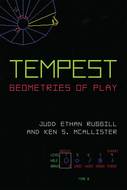
About the Book
Tempest is an arcade game by Atari Inc., originally designed and programmed by Dave Theurer. Released in October 1981, it was popular and had several ports and sequels and wide and lasting influence. The game is also notable for being one of the first video games with a selectable level of difficulty (determined by the initial starting level). The game is a tube shooter, a type of shoot ’em up where the environment is fixed and viewed from a three-dimensional perspective. Tempest introduced several new features for its time. It was one of the first video games to use Atari’s Color-QuadraScan vector display technology (along with Space Duel, which was released around the same time). It was also the first game to allow the player to choose their starting level (a system Atari dubbed “SkillStep”). This feature would increase the maximum starting level depending on the player’s performance in the previous game, essentially allowing the player to continue, a feature that became a standard in later video games. Finally, Tempest was one of the first video games to sport a progressive level design in which the levels themselves varied rather than giving the player the same level with increasing difficulty levels.
In this book, Ruggill and McAllister enumerate and analyze Tempest’s landmark qualities, exploring the game’s aesthetics, development context, and connections to and impact on video game history and culture. Specifically, they describe the game in detail, unpacking its latent and as well manifest audio-visual iconography and the ideological meanings this iconography evokes; consider the game generically, that is, in terms of the general styles and logics it initiated, reinscribed, and expanded upon; delve into its design and production history to reveal the creative and industrial processes that shaped the game’s development, release, and reception; and, finally, they analyze it as part of a franchise as well as a singular artifact.
About the Editors
Judd Ethan Ruggill is Assistant Professor of Communication Studies at Arizona State University and co-directs the Learning Games Initiative.
Ken McAllister is Professor of English and Director of the Rhetoric, Composition, and Teaching of English Graduate, College of Humanities Faculty Fellow for Research and Instructional Computing at The University of Arizona.